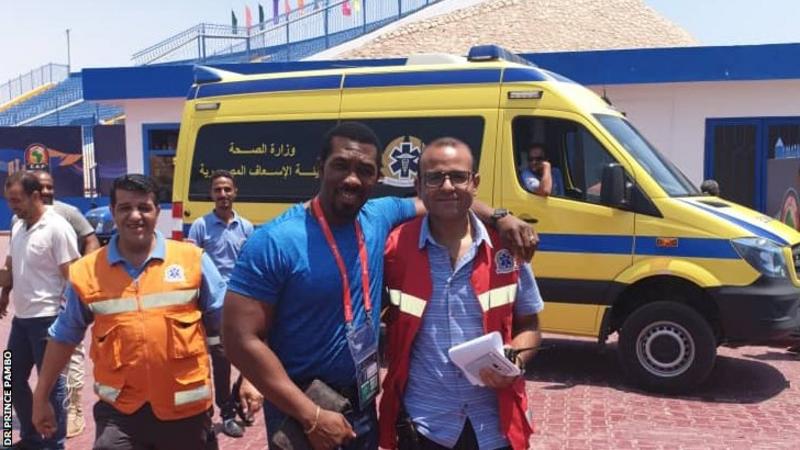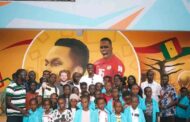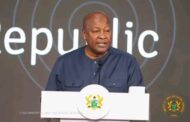Ghanaian sports medicine expert Dr Prince Pambo is confident that a collapse like Christian Eriksen’s could be dealt with similarly at the Africa Cup of Nations.
Dr Pambo, who is a member of the Confederation of African Football’s (Caf) medical expert group, however remains concerned about whether the measures in place for local league matches are adequate to deal with such emergencies.
In shocking scenes last Saturday Denmark’s Eriksen suffered a sudden cardiac arrest in the middle of a Euro 2020 tie against Finland, his life was saved thanks to the swift actions of his team-mates and medical staff.
“I can confidently tell you that if this happened at any of our venues during an Afcon – we would have been able to give the same level of care that Eriksen got in Denmark ,” Dr Pambo told BBC Sport Africa.
“The simple reason being that Caf has a group of experts in the medical committee – made up of sports physicians and emergency medical personnel and during Afcons such doctors are deployed to all the venues.
“Normally you go two weeks ahead of the tournament and you inspect all the medical infrastructure available at each venue. There are times when you conduct training for all the paramedics who will be present there.
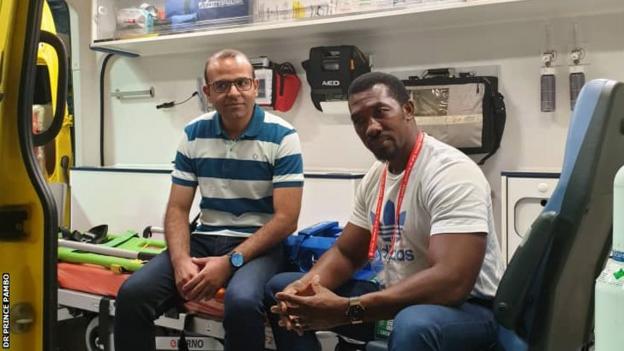
“You also take into consideration the distance between the stadium and the closest hospital and you also go and have interaction with the emergency medical team at the hospital.
“Every venue is always going to be equipped with a number of AEDs (Automated External Defibrillators) – so I can assure you that if this happened during an Afcon he would have had the same level of care.”
AEDs or Automated External Defibrillators are portable electronic devices that automatically diagnoses life-threatening cardiac problems and can treat them through defibrillation, the application of electricity to re-establish an effective heart rhythm.
The doctor led Caf’s medical team in Suez during the 2019 Africa Cup of Nations in Egypt and has also worked at many African Champions League and Confederation Cup Matches as well as other continental tournaments.
He is also a medical consultant for the Basketball Africa League.
Training still needed
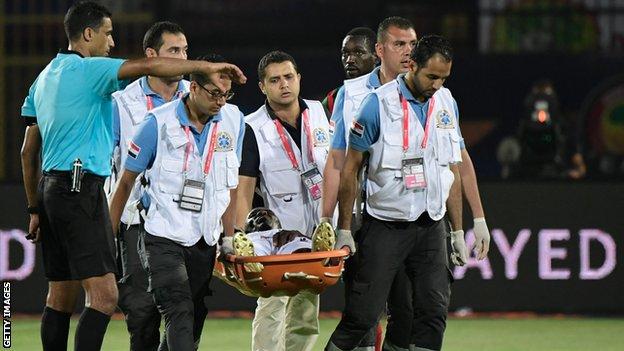
Dr Pambo said that work still needs to be done in local leagues around the continent and that this is something he is doing his best to address in Ghana.
“The key thing you need is your own brain as a human being to know what to do and that is how to do basic CPR,” he pointed out.
“Just a week before the Eriksen incident I was teaching students on Zoom – the Ghana Football Association and the University of Ghana have collaborated and come up with a training programme for masseurs and physiotherapists.
“We have realised in our local leagues most of the medical people attached to our teams are masseurs most of them (teams) don’t have doctors so we have a physios and masseurs – so we organise training for them.”
“There are avenues for training for people to have that basic skill and to use the AED you don’t have to be a medical person in fact you don’t need to be educated you just have to be trained and it takes less than 10 minutes.”
He added that in Ghana the cities of Accra and Kumasi are well equipped to deal with such medical emergencies but that further afield more work needs to be done.
Dr Pambo pointed out that match referees and match commissioners also play a crucial role in helping ensure player safety and wellbeing.
“If you get to the league centre as a referee or a match commissioner you need to inspect to see whether there is a functioning ambulance ready to work before you can sanction the match to start,” he insisted.
“We have been to venues where this an ambulance only to see that the tires are flat. Every referee has the right to decide not to start a game if he cannot see a fully equipped ambulance and paramedics ready.
“We want clubs to equip their medical teams with this knowledge so when they hear we are doing such training they should sponsor their masseurs to come forward or to hire qualified people,
“Most of these things we see happening during big games also happen during training sessions so clubs need to be better equipped.”
Source: BBC



